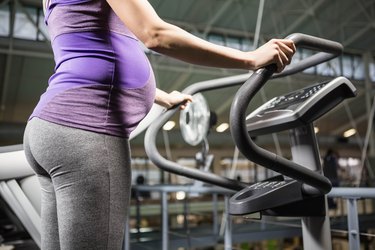
Walking on a treadmill while pregnant is generally a safe way to get daily exercise when you are carrying a baby. The amount of walking that is safe depends on your fitness level, how far along you are in the pregnancy and your general health.
Tip
It is generally safe to continue exercising and walking on a treadmill at the same pace as you did before pregnancy unless you have health complications or are into your third trimester.
Video of the Day
Safe Exercise During Pregnancy
The U.S. Department of Health and Human Services recommends that pregnant people get at least 150 minutes of moderate-intensity exercise every week. When you are pregnant, treadmill workout programs can be a beneficial and safe option to keep fit and meet this guideline. You can continue to walk on the treadmill and do the same workouts you did prior to your pregnancy.
Video of the Day
Tip
Regular exercise during pregnancy reduces the risk of excess weight gain and gestational diabetes. It also helps to reduce the symptoms of postpartum depression after delivery.
If you were not active prior to becoming pregnant or if you have health complications from the pregnancy, consult your doctor before walking on the treadmill or starting any other exercise program. Your doctor will recommend a safe program and monitor your progress. Be sure to increase the time and intensity of your workouts slowly.
There are exceptions and conditions that make exercise, including walking on a treadmill unsafe, states the National Academy of Sports Medicine. These include:
- Preeclampsia
- Bleeding in the second or third trimester
- Lung or heart disease
- Placenta previa
- Premature labor
Exercise Considerations During Pregnancy
During pregnancy your resting heart rate increases, which may affect your target heart rate while exercising. Instead of aiming for a target heart rate on the treadmill, aim for a perceived rate of exertion of five or six on a scale of one to 10 to ensure you are getting a good workout.
During your first trimester, some of your blood will be redirected to the uterus and you will also undergo hormonal changes, advises the National Academy of Sports Medicine. This may result in fatigue and dizziness when getting up. This may prevent you from working out at the intensity you are used to. By the second trimester, your blood volume will increase and these symptoms should subside.
You may also notice that you feel hotter as your body increases blood flow to the surface of the skin. Be sure to stay cool by wearing clothing that dissipates heat and staying hydrated during your workout.
When to Stop Exercising
Although exercise is generally safe during pregnancy, pay attention to warning signs that you may need to stop or cut back on your physical activity. Some signs that you need to stop exercising and consult your doctor include:
- Vaginal bleeding or fluid leakage
- Abdominal pain or uterine contractions
- Shortness of breath
- Dizziness
- Chest pain
- Headache
You may need to cut back on using the treadmill during pregnancy in the third trimester of your pregnancy. As you enter this part of your pregnancy, the baby becomes much more active and your belly will continue to grow larger, advises the University of Rochester Medical Center. In addition, your joints and muscles become looser as your body prepares for pregnancy. These factors may require you to decrease or stop your treadmill time and intensity.
- National Academy of Sports Medicine: "Exercise and Pregnancy: Physiological Changes and Exercise Programming"
- U.S. Department of Health and Human Services"Physical Activity Guidelines for Americans, 2nd Edition"
- University of Rochester Medical Center: "Third Trimester"
- American Pregnancy Association: "Exercise During Pregnancy"